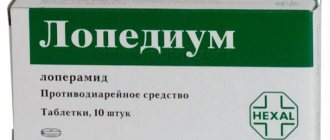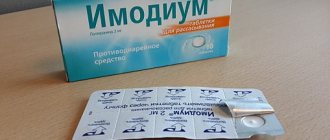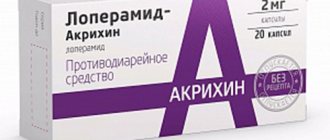Author of the article: Tironova Inna Igorevna
Gastroenterologist, therapist
15 years of experience
Professional skills: Colon hydrotherapy, treatment of gastrointestinal diseases
Both adults and children are equally susceptible to various digestive disorders. Loperamide is prescribed to children for diarrhea (diarrhea) that accompanies such illnesses. The drug is safe for children and provides quick relief.
Loperamide is used to treat diarrhea in children over 2 years of age. It reduces the speed of movement of feces and stimulates the tone of the anus. A decrease in bowel activity causes a decrease in the frequency of urges. This eliminates the risk of rapid dehydration.
Composition and release form
Antidiarrheal medication is one of the most effective drugs that can quickly eliminate stool disorders. Loperamide is produced in two forms:
- flat cylindrical yellowish-white tablets, packed in blisters of 10 or 20 pieces;
- capsules with a white-green gelatin shell, filled with powder, 10 or 20 pieces per package.
The drug is not produced in the form of drops, injection solutions, or syrup.
The active component of the antidiarrheal medication is loperamide hydrochloride, at a dose of 2 mg. The concentration of the active substance is the same in tablets and capsules.
The drug is also equipped with the following auxiliary components:
- talc,
- starch,
- aerosilom,
- lactose,
- Mg stearate,
- gelatin (capsules),
- silicon dioxide.
Operating principle
Loperamide is an antidiarrheal medication that can suppress intestinal motility. The active substance does not have a narcotic effect and does not penetrate the blood-brain barrier. The medicine acts quickly, 20–30 minutes after taking the tablet. The effect lasts up to 6 hours. The use of Loperamide in the fight against diarrhea in children provides:
- decreased motility of the gastrointestinal tract;
- prolongation of time for movement of stomach contents through the intestines;
- increased tone of the anal sphincter;
- fecal retention;
- reduction in urge frequency.
According to the instructions for use, the antidiarrheal effect is achieved due to the binding of the main component to opioid receptors and inhibition of the release of prostaglandins and neurotransmitters acetylcholine.
LOPERAMIDE
Antidiarrheal symptomatic drug
Release form, composition and packaging
| ◊ Capsules | 1 caps. |
| loperamide hydrochloride | 2 mg |
10 pieces. – contour cell packaging (1) – cardboard packs. 10 pcs. – blister contour packages (2) – cardboard packs.
pharmachologic effect
Loperamide, by binding to opioid receptors of the intestinal wall (stimulation of choline and adrenergic neurons through guanine nucleotides), reduces the tone and motility of intestinal smooth muscles, slows down the passage of intestinal contents, and reduces the excretion of fluid and electrolytes in feces. Increases the tone of the anal sphincter, promotes fecal retention and reduces the urge to defecate. The action occurs quickly and lasts 4-6 hours.
Pharmacokinetics
Absorption – 40%. The time required to achieve Cmax is 2.5 hours. Communication with plasma proteins is 97%. T1/2 – 9-14 hours. Does not penetrate the blood-brain barrier. Almost completely metabolized in the liver by conjugation. Excreted primarily by the intestines; a small part is excreted by the kidneys (in the form of conjugated metabolites).
Indications
Symptomatic treatment of acute and chronic diarrhea of various origins (allergic, emotional, medicinal, radiation: with changes in diet and quality composition of food, with metabolic and absorption disorders: as an adjuvant for diarrhea of infectious origin). Regulation of bowel movements in patients with ileostomy.
Dosage
Orally, without chewing, with water.
For adults
for acute and chronic diarrhea, 2 capsules (0.004 g) are initially prescribed, then 1 capsule (0.002 g) after each bowel movement in case of loose stools.
For acute diarrhea , children over 6 years of age
are prescribed 1 capsule (0.002 g) after each bowel movement in case of loose stools.
Maximum daily dose.
For acute and chronic diarrhea in
adults
– 8 capsules (0.016 g);
for children
– 3 capsules (0.006 g).
After normalization of stool or in the absence of stool for more than 12 hours, treatment with Loperamide should be discontinued.
Allergic reactions (skin rash), drowsiness or insomnia, dizziness, hypovolemia, electrolyte disturbances; dryness of the oral mucosa, intestinal colic, gastralgia, abdominal pain or discomfort, nausea, vomiting, flatulence.
Rarely – urinary retention, extremely rarely – intestinal obstruction.
Overdose
Symptoms:
depression of the central nervous system (stupor, loss of coordination, drowsiness, miosis, muscle hypertension, respiratory depression), intestinal obstruction.
Treatment:
antidote - naloxone; Given that the duration of action of loperamide is longer than that of naloxone, repeated administration of the latter is possible.
Symptomatic treatment:
activated carbon, gastric lavage, artificial ventilation.
Medical supervision is required for at least 48 hours.
special instructions
If there is no effect after 2 days. When using Loperamide, you should consult a doctor.
If constipation or bloating develops during treatment, loperamide should be discontinued. In patients with impaired liver function, careful monitoring for signs of toxic damage to the central nervous system is necessary.
During the treatment of diarrhea, it is necessary to replace the loss of fluid and electrolytes.
During the treatment period, care must be taken when driving vehicles and engaging in other potentially hazardous activities that require increased concentration and speed of psychomotor reactions.
Pregnancy and lactation
Contraindicated in the first trimester of pregnancy.
In the second and third trimesters of pregnancy, Loperamide can be prescribed in cases where the expected benefit of therapy for the mother outweighs the potential risk for the fetus. Since small amounts of Loperamide are found in breast milk, use during breastfeeding is not recommended.
For liver dysfunction
With caution: liver failure. In patients with impaired liver function, careful monitoring for signs of CNS toxicity is necessary.
In patients with impaired liver function, careful monitoring for signs of toxic damage to the central nervous system is necessary.
Storage conditions and periods
Store the drug in a dry place, protected from light, out of reach of children, at a temperature not exceeding 25°C.
Shelf life – 2 years. Do not use after the expiration date stated on the package.
The description of the drug LOPERAMIDE is based on officially approved instructions for use and approved by the manufacturer.
Found an error? Select it and press Ctrl+Enter.
Indications
Loperamide is one of the most effective and safe antidiarrheal medications. It can be given to children for diarrhea. The remedy can eliminate disorders of various origins. It is especially effective in the treatment of acute and chronic diarrhea caused by:
- changes in diet or diet;
- long-term or inappropriate use of medications with antibacterial properties;
- radiation therapy;
- stress and emotional stress;
- functional disruptions in the gastrointestinal tract;
- irritable bowel syndrome;
- nonspecific ulcerative colitis.
Loperamide is prescribed for children with infectious diarrhea (as part of complex treatment), as well as for those who have undergone surgery on the gastrointestinal tract. The use of tablets is also indicated for small patients with ileostomy.
Loperamide, when used correctly, normalizes the child's stool, reduces the frequency of urges and improves well-being.
Do not give medicine without first consulting your doctor. The doctor will select the required dose depending on the cause of the disorder, the severity of the disease, age and other individual characteristics of the child’s body.
At what age can you take Loperamide?
The use of antidiarrheal medication in children is limited. Children are more sensitive to the effects of the drug. Treatment with Loperamide is contraindicated in newborns. If you give the pills to an infant, it can lead to paralysis of the intestinal muscles and even death.
Up to 12 years of age, the drug is used strictly as prescribed by the doctor. The medicine is usually not prescribed for children under 6 years of age, and for children under 2 years of age, as well as infants, Loperamide is prohibited.
Contraindications and side effects
The use of the medicine is not recommended for children with lactose intolerance and enzyme deficiency. Despite the fact that one of the indications for the use of the drug is ulcerative colitis, the medicine is prohibited for use during exacerbation of this pathology. Loperamide should not be used for children with individual intolerance to the components of the product. Treatment of diarrhea in newborns and children under 2 years of age is excluded.
The medication is not prescribed for the following pathologies:
- intestinal obstruction;
- dysentery;
- diverticulosis;
- acute pseudomembranous enterocolitis;
- liver failure.
You should not give Loperamide to a child if there is constipation, bloating, fever, or if there is blood in the stool.
The medication is usually well tolerated, and adverse reactions after taking the tablets are extremely rare. Side effects are caused by inappropriate use of Loperamide. Taking the drug carries a risk of the following effects:
- partial intestinal obstruction;
- painful sensations;
- flatulence;
- dyspeptic disorders;
- xerostomia (dry mouth);
- pre-fainting states;
- drowsiness;
- temporary loss of consciousness;
- redness and itching of the skin, rashes.
If Loperamide is taken incorrectly, children may experience urinary retention. If such symptoms occur, it is necessary to refuse further treatment and be sure to consult a doctor so that he can prescribe another remedy.
Interaction
Concomitant use of loperamide with opioid analgesics may increase the risk of severe constipation.
The occurrence of serious cardiac problems is a consequence of drug-drug interactions. In particular, side effects have been described when loperamide is taken simultaneously with H2-histamine receptor inhibitors (cimetidine, ranitidine), antibiotics (clarithromycin, erythromycin), antifungal drugs (itraconazole, ketoconazole) and antiretroviral drugs (ritonavir).
When using drugs that have similar pharmacological effects, the effect is mutually enhanced.
Instructions for use and dosage
Only a doctor can select the correct dose of Loperamide for a child, and only after clarifying the cause of the disorder and taking into account the severity of the pathology, age, and weight of the baby:
- adolescents are prescribed to take 2 tablets immediately and 1 after each bowel movement;
- children 8–12 years old are advised to take 2 mg of the medicine three times a day;
- children 5–8 years old - 1 tablet twice a day;
- patients 4–5 years old - 1 mg of medication three times a day.
The medicine is not given to newborns, and children 2–4 years old are rarely treated with Loperamide. According to the official description, children from 4 years old can drink the product.
The daily dose is selected at the rate of 6 mg of the drug per 20 kg of weight. If, two days after taking Loperamide, no positive dynamics are visible, the stool has not returned to normal, or, conversely, the child’s condition has worsened, you should consult a doctor. Therapy is stopped if diarrhea is absent for 12 hours. The duration of the course is no more than 5 days.
Important conditions for treating diarrhea are drinking plenty of fluids and diet. Together with Loperamide, rehydration solutions are prescribed to replenish lost fluid.
Can children take loperamide: dangers when used
Reading time for this article: 11 minutes.
Neither adults nor children are immune from infection by food microorganisms, which can lead to disruption of the digestive tract. In this case, it is imperative to take medications that normalize the digestion process. One such drug is loperamide.
The antidiarrheal drug loperamide is used to treat acute and chronic disease. This therapeutic agent can slow down the peristaltic contractions of the intestinal walls.
It reduces the speed of passage of feces in the large intestine, and also reduces the lumen of the anus. The water-salt balance in the body is gradually normalized.
Thus, the drug eliminates diarrhea, protecting the body from dehydration, but without eliminating the cause of the disorder. That is, it can be called an auxiliary tool. In addition, the formation of mucous accumulations in the intestines is reduced.
The effect of the drug occurs very quickly. And it continues for 5 – 6 hours. Loperamide is used to treat children and adults. However, the question of whether children can take loperamide is quite controversial.
Application and dosage
This product is available in the form of capsules and tablets, or solution. The tablets are coated on the outside. They are designed to be absorbed. Each of them contains 2 mg of the active substance (loperamide hydrochloride). Corn starch, talc, and lactose are used as forming agents. The capsule form is called loperamide acry.
Parents often ask doctors a question before using loperamide: can children aged 2 years be given this drug to eliminate diarrhea? Doctors have different opinions on this matter.
When treating an acute process in children 2–5 years of age, they are prescribed to take the drug in an amount of 100 mcg per 1 kg. You need to take loperamide 2 or 3 times a day. Children from 6 to 8 years old - 2 mcg per 1 kg twice a day. From 9 to 12 years – 2 mcg per day 3 times.
However, the total daily dose should not exceed 6 mcg per 20 kg of the child’s body weight. In the case of a chronic process, the total daily dose of loperamide is 2 mg for children aged 5 years or more.
If within 12 hours the act of defecation is completely absent, the use must be stopped. If the child’s frequent urge to urinate does not stop for more than a day, it is recommended to give one tablet after each trip to the toilet.
And even in this case, they are allowed to slightly increase the dose. 6 mcg of the drug is given per 20 kg of body weight.
Can loperamide be given to children?
Loperamide is not prescribed for children under 2 years of age. Moreover, according to a number of experts, it is undesirable to use this remedy to treat children under 6 years of age. This is exactly what manufacturers of this product recommend all over the world.
And in some countries it is generally prohibited for children under 4 years of age. And in a country like Australia, they have completely stopped using this drug for children under 12 years of age, even in the most acute cases.
This probably happened due to fear of possible side effects, of which the drug has quite a few.
Loperamide is not recommended for children
Mistakes of the past
Loperamide is never prescribed to infants who are under one year of age. After all, its mechanism of action is to act on the smooth muscles of the intestine. And in children it can cause paralysis of these muscles.
Most often this turns out to be disastrous for the child. In the second half of the last century, several such cases were recorded in our country due to the use of the drug loperamide.
Unfortunately, the paralysis of the intestinal muscles could not be reversed, and the outcome was fatal.
As a result, in 1980, a decision was made to ban the use of loperamide for the treatment of diarrhea of any etiology in children under 2 years of age. Although, after a detailed study of the circumstances, it was found that the parents used this remedy without consulting a doctor.
However, they did not have a medical education or even the most general understanding of the effect of the drug. And they did not follow the dosage rules, and also did not take into account contraindications to taking this therapeutic agent.
And the most common contraindication was the infectious nature of the intestinal disorder; in such cases, taking loperamide is strictly prohibited.
But, nevertheless, in order to prevent such tragic cases, medical and pharmaceutical experts approved the decision that children under 2 years of age should not be prescribed this drug. If diarrhea occurs, other treatment options should be sought.
Prescription of loperamide in modern times
According to available data, WHO confidently states that loperamide does not have the required effect sufficiently on the body of children when they exhibit intestinal disorders and frequent diarrhea.
In addition, the risk of side effects of the drug on the child’s body, which is fragile and weakened by the disease, is quite high. Therefore, it was recommended to remove loperamide from the list of suitable drugs for the treatment of diarrhea.
Many parents mistakenly consider it a wonderful remedy for ridding their child of debilitating diarrhea. They do not always consult with doctors and study in detail the question of what kind of drug loperamide is and whether it can be given to children.
And at the same time, they are not puzzled by such a thing as determining the presence of infection and replenishing the loss of moisture and minerals.
However, if severe diarrhea occurs, then it may be used. After all, severe dehydration of the child’s body is possible and it is necessary to stop the process. If a child takes loperamide, he should definitely drink as much fluid as possible. However, to know for sure whether your child can take loperamide, it is recommended to consult a doctor.
Children under 6 years of age are prohibited from using the drug capsules. For treatment, only tablets are used, sometimes drops can be prescribed.
Diarrhea can be caused by a number of reasons. It can be caused by the consequences of radiation therapy, severe stress, sudden changes in diet, taking certain medications, and inflammatory processes in the body.
Loperamide is not recommended for children
Additional treatment
If taking loperamide, the child’s diet should be reviewed and limited. The baby must definitely follow a diet.
If there is no improvement in the general condition and well-being of the child while taking this drug, two days after the start of treatment, tests are required.
It is necessary to find out whether there was an infection with pathogenic microorganisms, which caused diarrhea and poor health. If this assumption is confirmed, treatment with antibiotics will be required.
Sometimes doctors prescribe after such treatment to repeat the course of taking loperamide if the diarrhea does not subside. And only after no liquid diarrhea has been noted for 12 hours, the use of this drug is stopped. The urge to defecate should not exceed 1 – 2 times during the day.
If loperamide is taken without a doctor’s prescription and consultation, if it is necessary to urgently relieve a child of diarrhea, then it is necessary to study the attached instructions in detail and use the product accordingly. Under no circumstances should the dose be exceeded. Especially when it comes to children under 6 years old. And don’t forget about changing your diet and drinking plenty of fluids.
Side effects
Just like other medications, loperamide has various side effects. And therefore, before using this tool, you need to familiarize yourself with them.
This is important to protect the child from possible complications or worsening of the condition.
This can especially manifest itself in the case of uncontrolled use of loperamide and the absence of additional measures to rid the child of debilitating diarrhea. In particular, the following symptoms can be observed.
- Colic in the intestines.
- Nausea and vomiting.
- Discomfort and severe pain in the stomach.
- Feeling of dryness in the mouth and throat.
- Decreased concentration.
- Deterioration of brain activity.
- Sleep disorders and even complete insomnia.
- Frequent and severe dizziness.
- Drowsiness and lethargy.
- Fainting.
- An allergic reaction that causes a rash on the skin, which is similar to a rash with urticaria. In fairly rare cases, urinary retention may also occur, which causes a disorder in the water-salt balance in the body.
With this in mind, it is necessary to approach taking loperamide with sufficient caution so as not to worsen the child’s already serious condition.
Contraindications
It is also very important to consider a number of contraindications for the use of loperamide in the fight against diarrhea. If any of them occurs, then it cannot be used; it is necessary to look for other methods of treatment.
- Individual intolerance to the drug by the child’s body.
- Intestinal colitis of various natures, including those caused by the use of antibiotics. Which may have caused the diarrhea. But loperamide is absolutely not suitable for treating it in this case.
- Inflammatory processes in the intestines, which may cause the presence of blood in the stool. Diverticulosis of the large intestine.
- Intestinal obstruction and bloating.
If at least one of the listed factors occurs, then loperamide should under no circumstances be used to treat a child, even in the case of an acute process. It will be necessary to find another equally effective drug to relieve the patient of diarrhea.
Thus, loperamide can be used to treat diarrhea in a child, but taking into account age, general condition, etc. However, it is still better for parents in this case not to self-medicate, but to definitely consult a specialist.
Source: https://mojnoli.ru/detjam-loperamid/
Overdose
If you give your child medication in large quantities or too often, increased irritability may occur due to central nervous system depression and sleep disorders. Also, abuse of Loperamide is fraught with:
- muscle weakness;
- impaired coordination of movements;
- intestinal obstruction;
- stupor.
If such symptoms appear in a child, it is necessary to rinse the stomach, give a sorbent and immediately take the baby to the hospital. In case of overdose, the use of the antidote Loperamide - Naloxone is indicated.
Analogs
If a child has contraindications to the use of this antidiarrheal medicine, in particular, individual intolerance, the doctor selects a substitute. Loperamide has many analogues both in terms of the active substance and the effect it produces. Some of the remedies can be given to children, but only after consultation with the doctor. Instead of Loperamide, the following is often prescribed:
- Enterol. The medicine is used as part of complex therapy for acute infectious diarrhea. Can be given to children from 2 years old.
- Lopedium. The product helps slow down bowel activity and eliminate diarrhea.
- Imodium. The drug is effective in combating disorders of non-infectious origin.
- Linux. Contains lyophilized probiotic bacteria that regulate intestinal microflora. Taking the drug ensures normalization of the functioning of the gastrointestinal tract, elimination of diarrhea and improvement of the child’s well-being.
- Diaremix. A mild action product, approved for use by children over 6 years of age.
- Loflatil. In addition to loperamide, the medication contains simethicone (a substance with carminative properties).
- Uzara. An effective herbal-based antidiarrheal drug. Can be given to children from 2 years old.
Pharmacology
The drug is considered a substance that inhibits intestinal motility, eliminates diarrhea, and promotes the release of acetylcholine and prostaglandin.
Thanks to this, signs of diarrhea are suppressed. During the period of its action, the peristalsis of the colon slows down and the time required for the movement of feces increases.
- therapy of infectious diseases of the gastrointestinal tract;
- colitis in ulcerative form, occurring in an acute stage;
- pseudomembranous enterocolitis;
- obstruction of the intestinal tract;
- first trimester of pregnancy and during breastfeeding. Although in these cases the use of the drug may be acceptable. But provided that the threat to the baby is negligible for the expected therapeutic effect for the expectant mother;
- increased individual sensitivity to some components contained in its composition;
- constipation, flatulence;
- children up to four years of age. But, in general, it is better to clarify this fact with a doctor, because online sources are written differently - in some it is allowed to be taken from 2 years old, in others when the child turns 4 years old. Therefore, consult with a specialist; it is quite possible that he will offer a similar remedy, because he has more experience than the potential authors of information material, which is based on several articles read;
- inflammation in the colon, causing an increase in body temperature and the presence of blood in the stool;
- functional disorder and liver failure.
Contraindications for tablets and capsules. Pills should not be taken if there is flatulence, constipation, or intestinal obstruction. And the second option for releasing the drug is for individual lactose intolerance, glucose-galactose malabsorption, lactose deficiency.
Reviews
Reviews about the treatment of diarrhea in children with Loperamide are mostly positive. People note the quick effect and long-lasting effect of the product. Many have managed to cure diarrhea in children caused by overeating, stress, and acclimatization. The drug does not harm the child’s body, is well tolerated and does not provoke unwanted reactions. Also, some used the medicine for disorders of infectious etiology, but as part of complex therapy. In addition, Loperamide is an inexpensive medicine.
Doctors do not advise giving the drug to children unless absolutely necessary, only when the number of bowel movements exceeds 3 times a day and the stool has a liquid consistency. Improper use of Loperamide leads to CNS depression. Doctors insist on preliminary consultation, diagnosis and clarification of the root cause of diarrhea.
User comments
loperamide for adults.
Because of the teeth, such diarrhea is unlikely. our doctors always have barely any teeth
oh that's right, mine is 1.5. now the remaining couple of teeth will come out and what’s next, what will we blame. ))) for a change in weather.
+100000. loperamide even for adults in extreme cases. give enterosgel and drink a lot; if he doesn’t drink, it’s from a syringe without a needle. you may have a rotavirus or enterovirus, there may be a one-time diarrhea on your teeth, and something like that is suspicious
His children are not allowed
Or better yet, an ambulance if diarrhea is more than 3 times a day
If nothing helps you, it's a virus, you need an ambulance.
teeth... they are visible and the doctor came today. I just didn’t say the dose... but the instructions only say from 6 years old.
Well, yours is not 6 years old.
And the pediatrician didn’t tell you that the diagnosis TEETH does not exist.
It was against the background of teething that the body weakened and caught the virus
And dehydration is very dangerous. If you have had diarrhea 7 times because of water, then a system is installed for dehydration.








